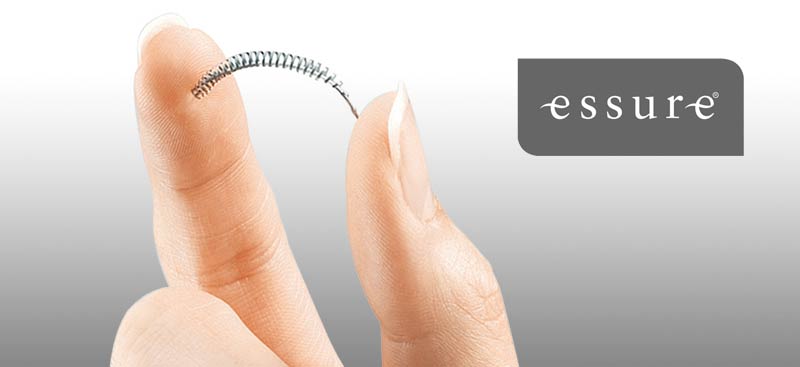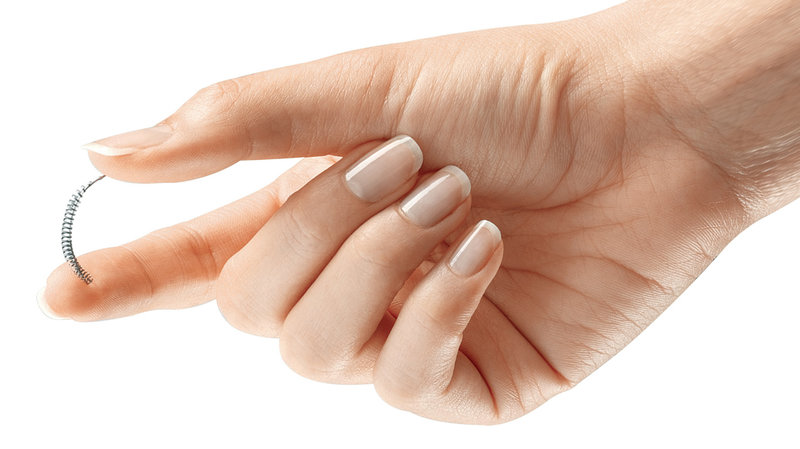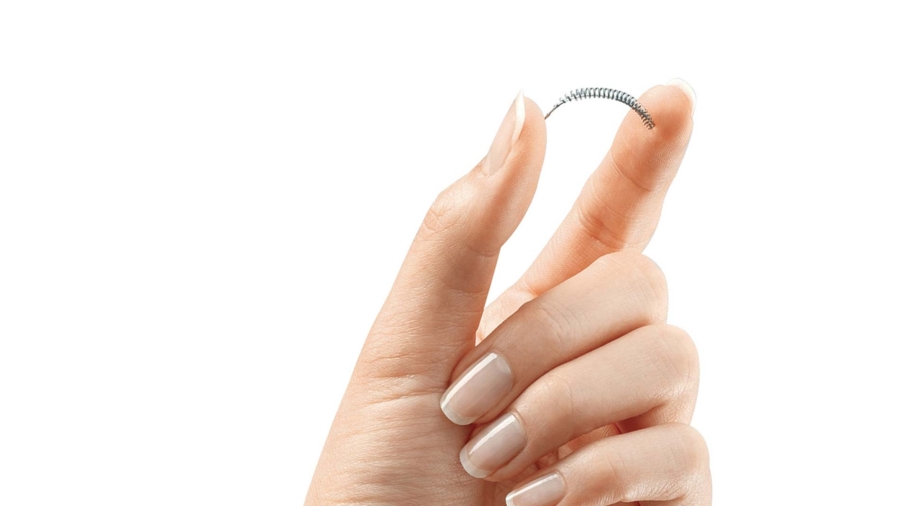Essure is a device used as a form of permanent birth control or sterilization for women. It is a metal coil which is inserted into both fallopian tubes to induce fibrosis- the thickening and scarring of connective tissue- and blockage.
Essure was developed by Conceptus Inc., an American medical device manufacturer, and approved by the Food and Drug Administration (FDA) in 2002. It was touted as the only FDA-approved non-incisional form of permanent birth control. Conceptus was acquired by pharmaceutical giant Bayer Agriculture of Germany in 2013.
The Essure device comes with a warning advising that some patients who have had the device implanted have reported complications including perforation of the uterus and/or fallopian tubes. As a result, reported symptoms include persistent pain, and in some patients, cases of the device becoming dislodged and moving into the abdominal or pelvic cavity.
The FDA also released information regarding the risks involved and complications reported in users of Essure. Short term risks include mild to moderate pain, cramping, bleeding, nausea, vomiting, dizziness, lightheadedness, and pelvic or back discomfort following the insertion. Long term risks include pain, unintended pregnancy, allergic or hypersensitivity reactions as well as the serious risks mentioned previously in the warning label. They also indicated that should Essure need to be removed, it would have to be done so surgically.
Should a pregnancy occur, the FDA stated that successful pregnancies and deliveries have been reported. However, complications during pregnancy and neonatal complications have also been occurred as well as ectopic pregnancies- pregnancy outside the uterus- which can cause serious complications.
In April 2018, the FDA sent correspondence to Bayer stating that they would be requiring health practitioners and patients to sign off after formal recognition of a slew of complications related to Essure. In addition, they decided that a “Black Box” warning label- the strongest warning label the FDA can place on a device or medication, was needed for Essure.
This is actually more common than you might think. Even with these serious indications, in most cases, devices and medications will remain on the market and pharmacies and health practitioners will comply with requirements to ensure that patients are fully informed of the risks involved in use of the device/medication in question. However, just two months later, in a stunning turn of events, Bayer announced that they were removing Essure from the market.
In July 2018, Essure gave a press release stating that Bayer would be discontinuing the sale of its device at the end of the year for “business reasons.” The news release stated that the decision was based on “ a decline in U.S. sales of Essure in recent years and the conclusion that the Essure business is no longer sustainable.” They made a point to note that the decision was not based on health concerns or complications related to the product and that they “continue to stand behind the product’s safety and efficacy, which are demonstrated by an extensive body of research.” But there may be more to the story considering the severity of risks associated with Essure use.

In an investor report released in October 2018, Bayer stated that they were currently facing lawsuits from over 18,000 women who used the Essure device. In these suits, plaintiffs allege personal injuries including hysterectomy, perforation of the uterus and/or fallopian tubes, pain, bleeding, weight gain, nickel sensitivity, depression, and unwanted pregnancy. For these allegations, they are seeking compensatory and punitive damages. To date, the suits remain individual cases and have not been rolled into a Multi-District Litigation (MDL) or been given class-action status.
Further adding fuel to the fire is a citizen petition from Koch Parafinczuk and Wolf, P.A. released in 2015. The document concluded that there is evidence that Conceptus, the Essure manufacturer, failed to report many of the adverse events they had knowledge of and fraudulently altered trial patient records to show only favorable information.
In December 2018, FDA Commissioner Scott Gottlieb, M.D., released a statement stating they had received more than 15,000 adverse effect reports related to Essure and they had ordered Bayer to complete a five year follow up study on the long term effects of Essure on the women who have used it despite their decision to withdraw it from the market. In so many words, he meant to indicate that the FDA’s concerns stand and that they would be watching Bayer closely.
While no major cases or verdicts have been made available to the public yet, by the companies own admission in 2017 Essure losses cost Bayer upwards of $413 million. Bayers financial records report €391 million in “Impairment” losses connected to Essure. Their statement about discontinuing Essure for business reasons may be accurate, but their statement about standing by its efficacy and safety appear disingenuine in light of these financial reports.
One legal fight that has managed to make it into the news is that of Kristiana Tweed Burrell, a woman who claims that she suffered a stillbirth and then underwent a hysterectomy due to complications from the Essure device.
Bayer appealed the decision to hear the case in its court of origin, North Carolina, and instead move it to a federal court. Their reasoning was that although the case seeks relief under the laws of North Carolina, there is a bigger question of whether or not Bayer complied with federal regulations and therefore, the case should be heard in a federal court. However, a three-judge panel of the 4th U.S. Circuit Court of Appeals denied Bayers motion.
Still the question remains about why Bayer ultimately decided to remove Essure from the market if they believed it to be safe and effective? Could it be an attempt to cut the potential for future losses after devastating reports from the FDA and patients became public? As a matter of fact, prior to FDA intervention, Essure lawsuits totaled a mere 3,000 compared to today’s whopping 18,000.
Citations:
Bayer. Bayer to voluntarily discontinue U.S. sales of Essure at end of 2018 for business reasons. July 20, 2018.
Bayer AG. Financial Statements 2017.
U.S. Food & Drug Administration. Essure Permanent Birth Control: Information for Patients. U.S. Dept. of Health and Human Services. Updated April 9, 2018.
Darian Carrow, Female Filings: A Look Into the Current Essure Lawsuits, JURIST – Academic Commentary, Feb. 12, 2019, https://www.jurist.org/commentary/2019/02/Darian-Carrow-female-filings-a-look-into-the-current-essure-lawsuits/

Katie Terrell Hanna
Katie Terrell Hanna is a professional freelance writer and consultant. She developed an interest in litigation journalism after an internship at the Office of State Attorney in the 15th Judicial Circuit of Palm Beach County, Florida. She is also a graduate of the Center for Pre-Law/Law Related Careers at the Gerald A. Williams Center for Pre-Law in West Palm Beach, Florida and was inducted into the Law Honor Society of her graduating class.

Get A Free Essure Case Review
If you or a loved one are one of the thousands of people who experienced complications after receiving an Essure birth control implant, you may be eligible for compensation.


